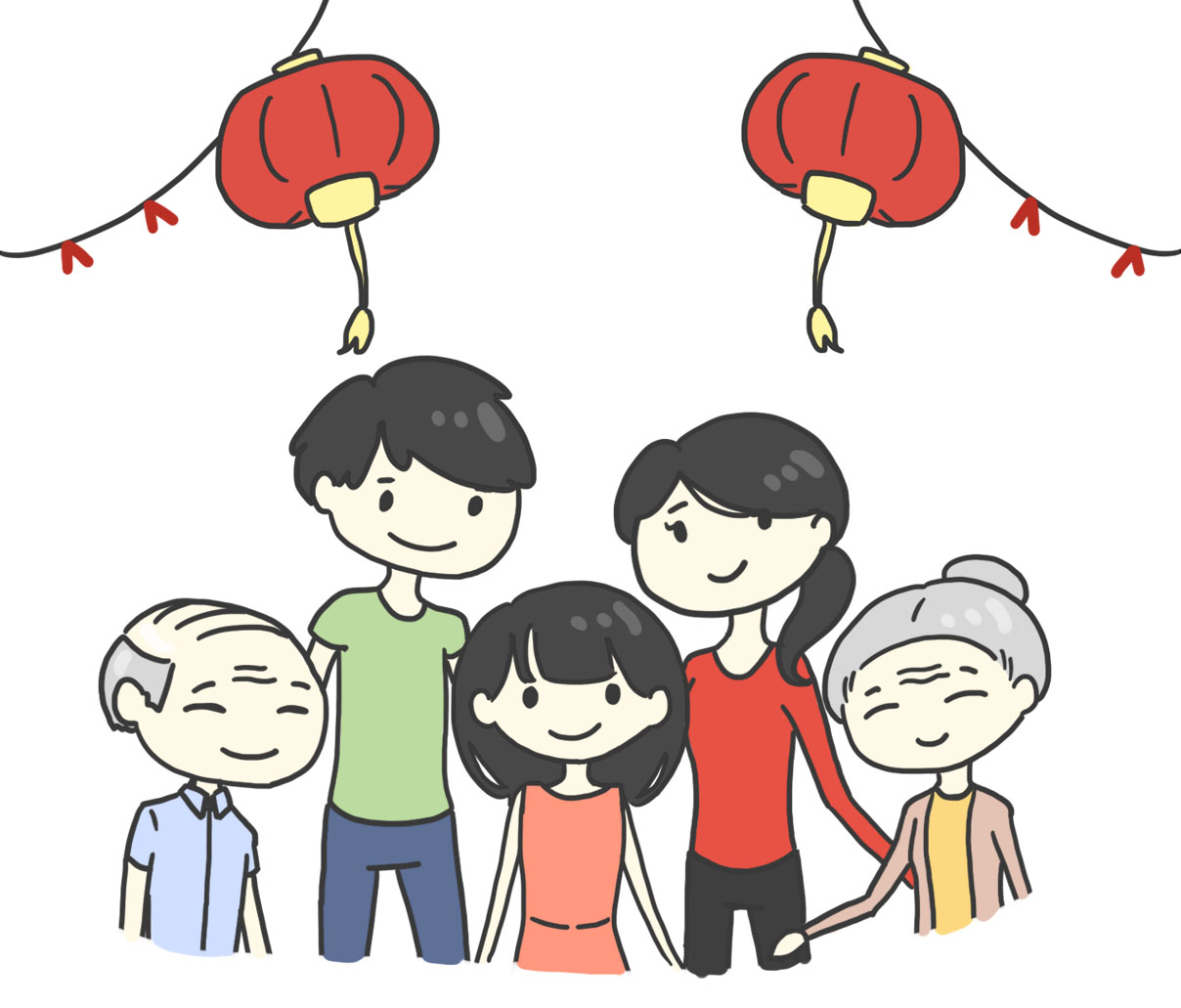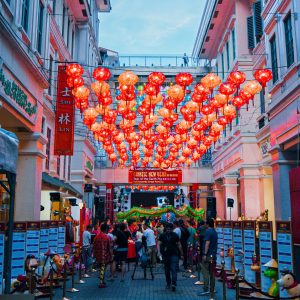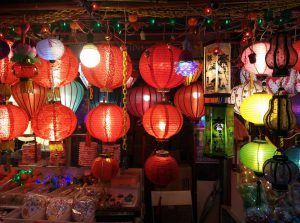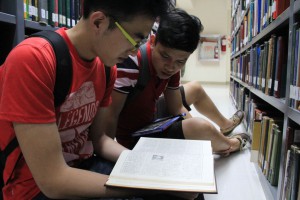I’m sure you’ve seen a Chinese family gathered in a restaurant, all of them wearing either a red top or red all throughout, chattering away and having a good time. No, it is not because of some extreme matching coincidence—it’s actually because of a Chinese custom. During the birthday of someone older than you, it’s a must to wear not blue, not orange, and definitely not white or black, but the color of happiness—red. But it doesn’t end there. There’s quite a lot more to be observed in just one birthday.
February 21, 2014
I slept really late last night. That must be the reason why my head feels heavy and my eyes droopy when I just woke up – and it’s just 5 A.M. in the morning. The day greets me with yesterday’s woes.
I have to print the written report of how my calamansi plant died before my 7:30 class begins, so I can hand it over to my Environmental Science professor and prepare for the oral report of how Marikina River should be used as a freshwater source in front of the whole class – not my specialty, I’ll admit.
An event not to be upstaged by my reporting crisis is my Gua-ma’s 82nd Birthday. As custom says, we have to eat a breakfast consisting of misua at her home – before my class. Hence, another reason for the heavy head, droopy eyes, and frequent yawns. I quickly took a bath and dressed in the appropriate clothing of the day: red.
I wore my red lace blouse I bought from Forever 21 from over a year ago out to the cold morning breeze. I entered an internet shop nearby and when it didn’t offer printing services (as did every internet shop nearby, to my horror), I resigned to getting it printed in the school’s Matteo Ricci or CTC printing services later on and hopped on the car. We were going to her house.
My Grandmother was the highest authority in our extended family during this time. As a young girl, her family, as many others, had migrated from Fujian province in China to evade the scarcity of jobs there. At sixteen, she was arranged to marry my Gua-kong from Dadao, Guangdong province. At twenty, she gave birth to my eldest aunt and nine others soon followed in quick succession, child number eight being my mother. At age sixty-two, she was widowed by cancer. She became both our Gua-kong and Gua-ma. We called her “Ama.”
Her short, black hair, adorning a youthful face at 82, Ama was a strong woman. Years of her hard work and perseverance had helped my Gua-kong in running their business. Even with no accounting experience, whatsoever, their accounting firm rose to become one of the top five in the country from the 60’s to the 90’s. Even until today, she remains to be in charge of their business ventures – definitely a force to reckon with in the family.
I can recall times of when she, my brother, and my mother, along with Ama and several other aunts, would have sporadic trips to Tagaytay, years back. We would pay a visit to Royal Tagaytay, a resort, and spend the afternoon observing golfers who would skillfully get the ball into the holes in their golf field. Perhaps “swim” in the public swimming pool, explore the green fields of the area, or eat in their buffet section, among other options. By the time the sun sets, we were already on our way to her home – that familiar place that holds memories of every Sun family gatherings and also, our destination today.
It’s six-something on the clock. We enter her red-painted gate into her driveway, garden, and into her two-storey home, each of us holding a bunch of baskets. Mine contained twelve boxes of uncooked misua, my brother’s a basket of twelve cans of pork leg, my Dad’s a box filled with exactly a hundred eggs, and finally, my mom’s which was wrapped in a neat red and gold wrapper – her personal gift. Each of which have different meanings meant to give the celebrant a happy and long life, an annual thing for Chinese daughters to give their mothers.
She was still asleep, and we had come for her to see us. But at this moment, I was worried for my school report and immediately left, not even having a bite of their delicious misua and foregoing the one thing Chinese children deem important at such events: the angpao giving.
It would always be like this: my cousins and I would always be sitting on their elongated, pink couch every visit. My fifth aunt would then call our attention one by one to Ama’s presence, where she would give us our red enclosed treasures and we reply “thank you, Ama” in our provincial dialect, Fukien. I would say those words of gratitude and go back to the couch. Later, when I came home, I would stare at the beautiful, intricate designs imprinted on the skin of the envelope that matches my clothes: red, and delight in counting the crisp, new Peso bills inside. Today, however, I was going out of there empty-handed.
I arrived in school, late, but nevertheless, I was still able to print my report and managed to be on time for the submission and for my reporting. But just when school was finally over, I hurried home. I would be celebrating her birthday once more.
Ama gave birth to ten children. That number multiplied into a family of over thirty members, yet everyone was present for dinner at Gloria Maris Sharksfin restaurant that night. We were all seated in three tables with Lazy Susans, making the sharing of food easier. In these gatherings, the main star would now become the food. One dish that is not to be overlooked is the birthday noodles, thought to bring longevity. That, and an array of Chinese dishes, including roasted pigeon and steamed fish, was served to us. Forget the angpao, this was my favorite part.
Deserts – red bean soup, egg tarts, and pie – were devoured and we all stood up to end the dinner at around 10:30PM. We were off yet again, not home, but back to Ama’s house for the blowing of the birthday candles.
The cake was a good three feet tall, adorned in thick red and yellow icing with a Styrofoam cutout of the Chinese character for longevity. We stood in a circle around the table and sang both the Mandarin and English versions of “Happy Birthday”. The lit candles, shaped “8” and “2”, were blown out by the birthday celebrant amidst the rapid clicking of camera shutters. My aunts sliced up the cake and when each family was given their share, the celebration was over.
It was nearing 12 A.M.
When we reached home, we were all exhausted from the day’s activities. Mom placed the cake in the refrigerator; my brother opened his laptop, while I, still in red, crashed onto my bed. The celebration, albeit tiring, was worth it. Another year of Ama being with us, is indeed a blessing and this shows our love and appreciation for someone who has been a key figure in our lives.
Besides, this is what marks us as Chinese-Filipinos. The traditions reflect our roots from my grandparents’ migration. I glanced at my brother’s empty angpao, the beautiful, etched design of flowers behind the sole gold Chinese character on it. It read, “Happiness”.
Gua-ma – what the grandchildren call their grandmother on the mother’s side
Misua – a type of noodle which is consumed during birthdays
Ama – what the grandchildren call their grandmother on the father’s side
Gua-kong – what the grandchildren call their grandfather from the mother’s side
Angpao – red envelopes containing money usually given during events (hong pao in Mandarin)
Written by Faith Ong.
Illustration by Kathleen Calansanz




